The Olympic Games 1896 Athens
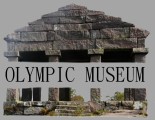

The Olympic games which recently took place at Athens were modern in character, not alone because of their programs, which substituted bicycle for chariot races, and fencing for the brutalities of pugilism, but because in their origin and regulations they were international and universal, and consequently adapted to the conditions in which athletics have developed at the present day. The ancient games had an exclusively Hellenic character; they were always held in the same place, and Greek blood was a necessary condition of admission to them. It is true that strangers were in time tolerated; but their presence at Olympia was rather a tribute paid to the superiority of Greek civilization than a right exercised in the name of racial equality. With the modern games it is quite otherwise. Their creation is the work of "barbarians."
It is due to the delegates of the athletic associations of all countries assembled in congress at Paris in 1894. It was there agreed that every country should celebrate the Olympic games in turn. The first place belonged by right to Greece; it was accorded by unanimous vote; and in order to emphasize the permanence of the institution, its wide bearings, and its essentially cosmopolitan character, an international committee was appointed, the members of which were to represent the various nations, European and American, with whom athletics are held in honor. The presidency of this committee falls to the country in which the next games are to be held. A Greek, M. Bikelas, has presided for the last two years. A Frenchman now presides, and will continue to do so until 1900, since the next games are to take place at Paris during the Exposition. Where will those of 1904 take place? Perhaps at New York, perhaps at Berlin, or at Stockholm. The question is soon to be decided.
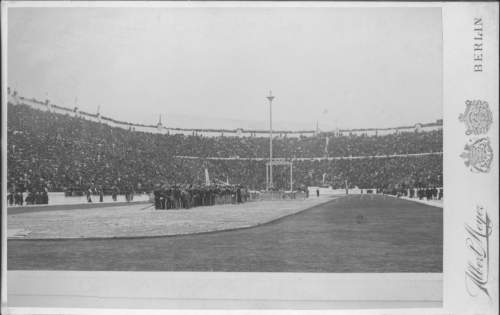
The Panathenaen Stadium, Opening Ceremony
The harmonious strains of music floated on the air and kindled a
fire of enthusiasm in every listener' s breast. Everyone was profoundly
touched, the spirit of antiquity seemed to hover round the Stadion. The
composition of Mr Samara created an immense sensation, and was applauded
as it deserved. The melody is slow and soft at the commencement becomes
gradually more lively and ends in a triumphant crescendo swelled by all
the voices and every instrument in the orchestra. Frenetic applause resounded
from every part of the Stadion at the conclusion of this hymn, its repetition
was unanimously demanded, the King himself expressed his warm approval
by applauding vigorously, and after it having been played 1a second time
renewed cheers greeted the composer.
But the most solemn moment of the day was approaching ; the Games
were to begin.
Source document: Official Report 1896
It was in virtue of these resolutions passed during the Paris Congress that the recent festivals were organized. Their successful issue is largely owing to the active and energetic cooperation of the Greek crown prince Constantine. When they realized all that was expected of them, the Athenians lost courage. They felt that the city's resources were not equal to the demands that would be made upon them; nor would the government (M. Tricoupis being then prime minister) consent to increase facilities. M. Tricoupis did not believe in the success of the games. He argued that the Athenians knew nothing about athletics; that they had neither the adequate grounds for the contests, nor athletes of their own to bring into line; and that, moreover, the financial situation of Greece forbade her inviting the world to an event preparations for which would entail such large expenditures. There was reason in these objections; but on the one hand, the prime minister greatly exaggerated the importance of the expenditures, and on the other, it was not necessary that the government should bear the burden of them directly. Modern Athens, which recalls in so many ways the Athens of ancient days, has inherited from her the privilege of being beautified and enriched by her children. The public treasury was not always very well filled in those times any more than in the present, but wealthy citizens who had made fortunes at a distance liked to crown their commercial career by some act of liberality to the mother-country. They endowed the land with superb edifices of general utility theaters, gymnasia, temples. The modern city is likewise full of monuments which she owes to such generosity. It was easy to obtain from private individuals what the state could not give. The Olympic games had burned with so bright a luster in the past of the Greeks that they could not but have their revival at heart. And furthermore, the moral benefits would compensate largely for all pecuniary sacrifice.
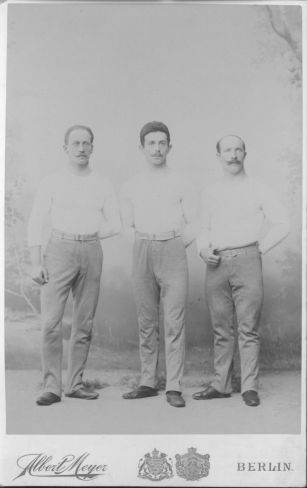
| Hermann Weingärtner, 3rd Horse Vault 2nd Pommelled Horse 2nd Rings 1st Horizontal Bar Participant in Parallel Bars 1st Parallel Bars, Team 1st Horizontal Bar, Team |
Alfred Flatow 2nd Horizontal Bar 1st Parallel Bars 1st Parallel Bars, Team 1st Horizontal Bar, Team Participant in Horse Vault Participant Rings |
Carl Schuhmann, 1st Horse Vault Participant in Pommelled Horse 5th Rings 1st Parallel Bars, Team 1st Horizontal Bar, Team Participant in Horizontal Bar Participant in Parallel Bars Participant in long jump Participant in triple jump Participant in shot put |
This the crown prince apprehended at once, and it decided him to lend his authority to the organizing of the first Olympic games. He appointed a commission, with headquarters in his own palace; made M. Philemon, ex-mayor of Athens and a man of much zeal and enthusiasm, secretary general; and appealed to the nation to subscribe the necessary funds. Subscriptions began to come in from Greece, but particularly from London, Marseilles, and Constantinople, where there are wealthy and influential Greek colonies. The chief gift came from Alexandria. It was this gift which made it possible to restore the Stadion to its condition in the time of Atticus Herodes. The intention had been from the first to hold the contests in this justly celebrated spot. No one, however, had dreamed that it might be possible to restore to their former splendor the marble seats which, it is said, could accommodate forty thousand persons. The great enclosure would have been utilized, and provisional wooden seats placed on the grassy slopes which surround it. Thanks to the generosity of M. Averoff, Greece is'now the richer by a monument unique of its kind, and its visitors have seen a spectacle which they can never forget.
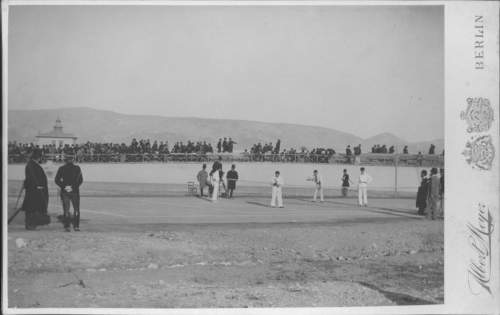
The Lawn-Tennis Competition
This graceful outdoor game took place in a tent near the columns
of the temple of Jupiter, in the morning of the same day. The match was
either single game, or double game; the players were divided into several
sets. In the single games took part 4 sets. 15 people in all, amongst whom
6 Greeks. A great many amateur players showed the greatest interest in
this sport ; but that day's match was only an eliminatory contest, the
decisive contest was fixed for the next following day.
Source document: Official Report 1896
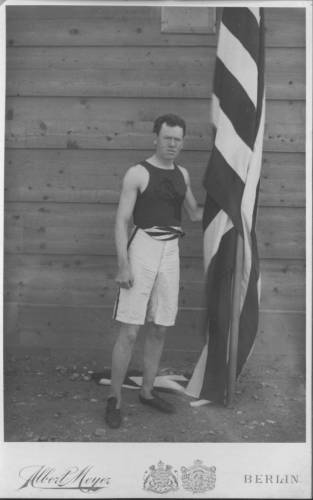
James Connolly, USA
Long jump
Only a few minutes elapsed before the competitors in the Long jump
had taken their places. This sport is well known in Greece and excited
therefore the Public curiosity. 10 Competitors took part in it amongst
whom 2 Greek youths M. Persakis of Athens and M. Zoumis of Chalcis. Each
competitor jumped in turn ; The superior skill however of the American
Connolly was soon recognised by everybody. A young Frenchman, brought up
in Athen. M. Toufferis made himself remarked by his extraordinary agility.
M. Persakis was considered by everybody the most graceful jumper. Mr Connolly
won by a jump of 12 mtrs 70 cent. Mr Persakis came in third by a jump of
12 mtrs. This contest was a decisive one. On a black tablet the exploit
of the Olympion Victor Connolly was duly inscribed, and in com pliment
to his nationality the American flag was hoisted in the centre of the arena,
by sailors of the Royal navy, stationed there for that purpose.
Mr Connolly is a member of the Athletic Club of the town of Suffolk,
America. All the spectators applauded enthusiastically and their shouts
mingled with the prolonged cheering of the countrymen of the victor, the
peculiarity of which excited much amusement.
Mr. Connolly was also winner in the triple jump.
Source document: Official Report 1896
Two years ago the Stadion resembled a deep gash, made by some fabled giant, in the side of the hill which rises abruptly by the Ilissus, and opposite Lycabettus and the Acropolis, in a retired, picturesque quarter of Athens. All that was visible of it then were the two high earth embankments which faced each other on opposite sides of the long, narrow race-course. They met at the end in an imposing hemicycle. Grass grew between the cobblestones. For centuries the spectators of ancient days had sat on the ground on these embankments. Then, one day, an army of workmen, taking possession of the Stadion, had covered it with stone and marble. This is the work that has now been repeated. The first covering served as a quarry during the Turkish domination; not a trace of it was left. With its innumerable rows of seats, and the flights of steps which divide it into sections and lead to the upper tiers, the Stadion no longer has the look of being cut out of the hill. It is the hill which seems to have been placed there by the hand of man to support this enormous pile of masonry. One detail only is modern. One does not notice it at first.
The dusty track is now a cinder path, prepared according to the latest rules of modern athletics by an expert brought over from London for the purpose. In the center a sort of esplanade has been erected for the gymnastic exhibitions. At the end, on each side of the turning, antiquity is represented by two large boundary stones, forming two human figures, and excavated while the foundations were being dug. These were the only finds; they add but little to archaeological data. Work on the Stadion is far from being completed, eighteen months having been quite insufficient for the undertaking. Where marble could not be placed, painted wood was hastily made to do duty. That clever architect M. Metaxas cherishes the hope, however, of seeing all the antique decorations restored statues, columns, bronze quadrigae, and, at the entrance, majestic propylasa.
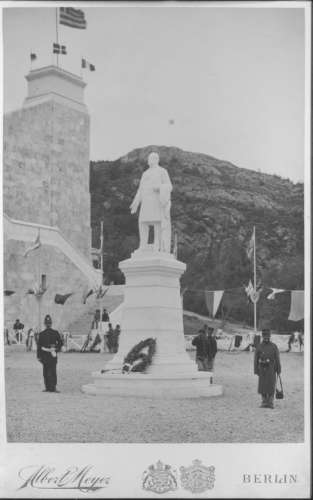
Statue of Georgios Averoff in front of thePanathenean Stadium
One of the members of the Council Mr G. Rhomas proposed that the
General Secretary of the Committee should be sent at once to Alexandria
to explain the money difficulties, which threatened to crush the celebration
of the Olympic Games at its beginning to M. Averoff, and to ask for his
assistance in the restoration of the Stadion. This proposition only feebly
supported by some, was vehemently opposed by others. Their opposition or
indifference arose from their doubts about the way in which this proposition
could be made acceptable to Mr Averoff. But the august president of the
Council thought this suggestion a very good one, and followed it up at
once, by writing himself to M. G. Averoff, exposing the whole difficulty,
as well as the hopes and plans of the Committee, and asked him to give
his patriotic help. This letter was intrusted to the General Secretary,
who had to proceed forthwith to Alexandria, to transmit to M. Averoff the
wishes and hopes of the first heir born to the Hellenie Dynasty. Once more,
with tact and discernement, the Prince had acted judiciously. M. Averoff
most generously waited for no further entreaties, but immediately signified
to the bearer of the letter his intention of taking upon himself the entire
costs of the restoration of the Stadion He acceded to all the demands of
the Council in so liberal and patriotic a spirit, he showed so much energy
in action, that he made for himself a name for ever dear to his countrymen.
No time was lost over the inspection of the plans, which were laid before
him immediately. He entirely concurred with the suggestions of the Special
Commission, and approved of all the estimates, which had been vastly underrated
at first. A capital of 585,000 Drs. had been deemed sufficient to cover
all expenses, but going still more particularly into all the calculations
it was found, that at least 920,000 Drs were required to accomplish the
restoration satisfactorily. The clearing of the Stadion alone was an expensive
undertaking. Now by the generosity of M. G. Averoff the most serious difficulty
was removed! no wonder that the Hellenes in all parts of the word hailed
him as the man, who alone had made possible the revival of the Olympic
Games in Greece. Seventeen centuries after Herodes Atticus, but more fortunate
than he, he was able to accomplish the restoration of the Pan-Athenaic
Stadion, not to surrender it to an alien governor, sent by a conquering
race, but to him, who by the free choice of the Nation, has been called
to keep guard over its destinies, to the King of a liberated Greece, who
was to receive in its enclosure the homage of the representatives of the
whole universe, and to proclaim under the beautiful sky of a free country
the inauguration of the first International Olympic Games. The Prince prososed
forthwith, and the Council voted unanimously, that at the expense of the
Committee a statue should be erected to M. Averoff, as a token of gratitude.
This statue, designed and executed by M r George Vroutos, sculptor and
professor at the School for Fine Arts in Athens, was placed at the entrance
of the Stadion, and unveiled March 24th. 1896, the day before the opening
of the Olympic Games by the Prince himself, in presence of his Royal brothers,
the authorities of the kingdom and a multitude of Greeks and foreigners.
The large crowd, which covered the surrounding hills greeted then with
enthusiastic shouts the statue of him, who after so many centuries had
given back to the Stadion its life and ancient splendour.
Source document: Official Report 1896
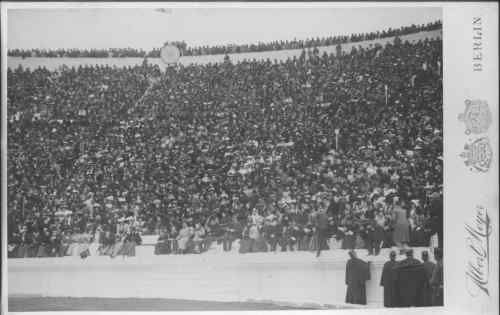
Most of the wedges were filled with spectators, long before the
hour fixed for the begining of those games. Most of the seats were already
occupied before 2 o'clock. One of the kerkides had been reserved for the
official deputies. The whole sight was most impressive ; never before had
such a large crowd been collected together on one spot. What contributed
most successfully to the bright and animated spectacle, which presented
itself before all eyes, was the festive attire of the ladies, the gay colours
of their headgears and fans, the brilliant uniforms of the officers, the
waving plumes on their helmets etc. All along the wall and outside on the
surrounding hills, stood a great many spectators, who took such a keen
interest in the games, that for hours together they kept their places,
standing in a close ring all round the Stadion. The Hill which lies to
the West of the Stadion looked seen from below, like a large pyramid of
heads. The decorations of the Stadion were most splendid ; the standards
with the coat of arms and the colours of most of the nations in the Old
and New World were planted all round the enclosing wall. Large flags waved
above the entrance, tripods stood on either side. Near the sphendone stood
in their original places those Hermae, which had been discovered in the
last excavations, all the seats were covered with cushions. In the middle
of the arena stood the members of the different committees and other functionaries
awaiting the arrival of the Royal Family. One after another the different
bands of music made their entrance and took their places. At 3 p. m. the
King and Queen arrived ; they were received at the doorway by their R.
H. the Crownprince and Prince George, the president of the Committee of
the games, the ministers, the civil and military authorities and the members
of the different Committees.
Source document: Official Report 1896